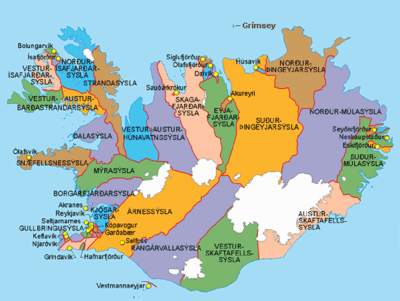Counties of Iceland

 |
| This article is part of a series on the politics and government of Iceland |
| Constitution |
|
Institutions |
|
|
Iceland is traditionally divided into 23 counties, sýslur or 23 independent towns, kaupstaðir. Today this division is no longer significant as far as administration is concerned. Iceland is now split up between 24 sýslumenn (magistrates) that are the highest authority over the local police (except in Reykjavík where there is a special office of police commissioner) and carry out administrative functions such as declaring bankruptcy and marrying people outside of the church. The jurisdictions of these magistrates often follow the lines of the traditional counties but not always. When speaking of these new "administrative" counties the custom is to associate them with the county seats rather than using the names of the traditional counties, even when they cover the same area.
Composition
Independent towns (kaupstaðir) were first created in the 18th century as urbanization began in Iceland, this practice continued into the 1980s the last town that was declared an independent town was Ólafsvík in 1983. Since then, the laws regarding municipalities have been changed in such a way that there is no longer any distinction made between urban or rural municipalities.
Traditional counties
The traditional counties are:
- Árnessýsla
- Austur-Barðastrandarsýsla
- Austur-Húnavatnssýsla
- Austur-Skaftafellssýsla
- Borgarfjarðarsýsla
- Dalasýsla
- Eyjafjarðarsýsla
- Gullbringusýsla
- Kjósarsýsla
- Mýrasýsla
- Norður-Ísafjarðarsýsla
- Norður-Múlasýsla
- Norður-Þingeyjarsýsla
- Rangárvallasýsla
- Skagafjarðarsýsla
- Snæfellsnes-og Hnappadalssýsla
- Strandasýsla
- Suður-Múlasýsla
- Suður-Þingeyjarsýsla
- Vestur-Barðastrandarsýsla
- Vestur-Húnavatnssýsla
- Vestur-Ísafjarðarsýsla
- Vestur-Skaftafellssýsla
Independent towns
The 23 independent towns are:
- Akranes
- Akureyri
- Bolungarvík
- Dalvík
- Eskifjörður
- Garðabær
- Grindavík
- Hafnarfjörður
- Húsavík
- Ísafjörður
- Keflavík
- Kópavogur
- Neskaupstaður
- Ólafsfjörður
- Ólafsvík
- Reykjavík
- Sauðárkrókur
- Selfoss
- Seltjarnarnes
- Seyðisfjörður
- Siglufjörður
- Vestmannaeyjar
See also
| ||||||||||||||||||||||||||||||||
| |||||||||||